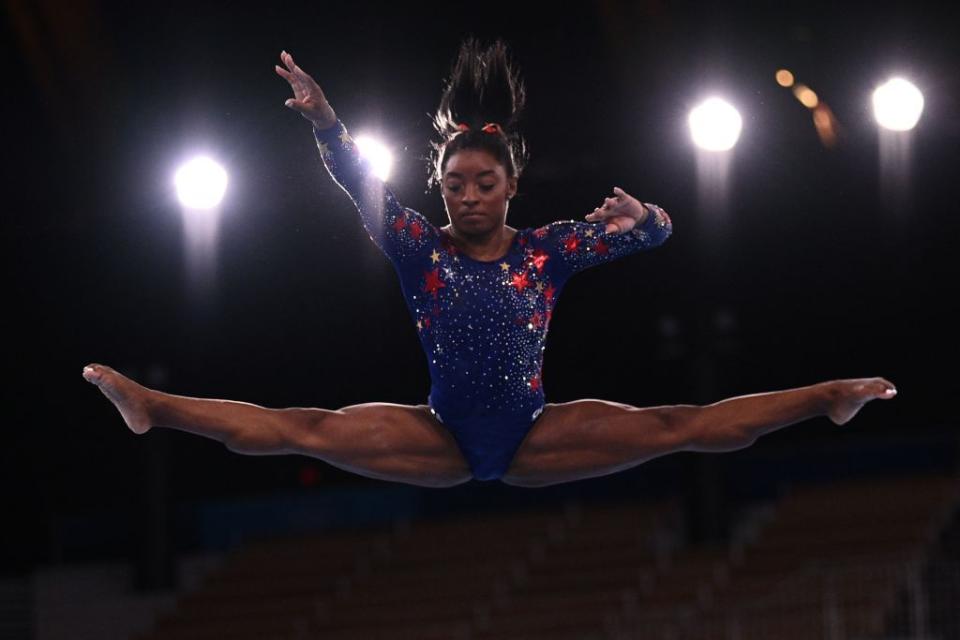Why Mental Health Is The Real MVP Of The 2024 Olympic Games

It wasn’t Simone Biles becoming the first woman ever to land the hardest vault in history at an Olympic Games that cemented her status as one of the most celebrated gymnasts of all time. Nor was it her dazzling audiences while making history in custom diamanté Ralph Lauren, nor the fact that she did all of this while also nursing a serious calf injury as she performed on Saturday as part of the 2024 Paris Olympics. No, what affirmed Biles’ star status is her doing all of this against the backdrop of fluctuating mental health.
For the uninitiated, Biles made her dominant debut at the 2016 Summer Olympics in Rio de Janeiro, in which she won four gold medals, before entering the 2020 Tokyo Olympics not only as a favourite to replicate those feats, but as one of the Games' most famous faces. But during the Tokyo Games, as her body twirled and twisted through the air in a vault, it seemed as though some part of Biles was lost. Suffering from what is referred to as the 'twisties' during her time in the air – a psychological phenomenon in the sport when a gymnast experiences a disconnect between their body and mind while performing a skill, like the twists – she eventually withdrew from the team finals, citing her mental health as the reason, and had a two-year break from the sport.
FIND OUT MORE ON ELLE COLLECTIVE
'After the performance I did, I just didn't want to go on,' Biles said at the time. 'I have to focus on my mental health. I just think mental health is more prevalent in sports right now. We have to protect our minds and our bodies and not just go out and do what the world wants us to do. I don't trust myself as much anymore. Maybe it's getting older. There were a couple of days when everybody tweets you and you feel the weight of the world.'

Athleticism is about the symbiosis of mental acuity and physical fortitude. Yet it was refreshing to see that a celebrated gymnast showing the courage to show her vulnerability as both athlete and human. Going for gold is one thing, but going for gold under the buckling weight of ailing mental health is a feat that deserves its own award category entirely. It's a subject that's been overlooked and hushed up in vague statements about why athletes have decided to take break from their sports for far too long – until now.
As she competes in the Paris Olympics this year, Biles has been clear about the changes in training she's made in order to prepare. 'I'm making a bigger effort into taking care of my mind and my body, which includes going to therapy once every week, usually a Thursday is kind of my therapeutic day and I try to take a day for myself,' she said last year ahead of the World Championships. 'It's really important that I'm taking care of my mind as much as I do my body, especially in this sport and outside of the sport.'
Biles is not the only Olympian who has been candid about the mental health journey they've traversed on their journey to success. Kimberley Woods, who won Team GB their third gold medal of the Paris Games in the canoeing category over the weekend, has also spoken candidly about her long-term struggles with mental health and self-harm, twice checking into a private mental health hospital and experiencing suicidal thoughts at her lowest points. In an interview with The Guardian, Woods, who was introduced to the sport by her aunt Diane – a silver medallist at the 1994 World Junior Championships – said she had not harmed herself since after a race just before the Tokyo Olympics, noting that the medal 'makes everything worth it'.
Hours after Woods' triumph, Adam Peaty wept tears of joy, as he celebrated his silver medal win, just a year after taking time away from swimming to deal with his ailing mental health and issues surrounding alcohol abuse. 'It doesn't matter what the time says on the board, I know that in my heart I've already won,' he said following his silver medal win on Sunday following the 100m breaststroke final. 'I'm not crying because I've come second, I'm crying because it took so much to get here.'

Whereas once there was a time when showing signs of mental weakness was viewed as a threat to performance, today it is one of the strongest things an athlete – or anyone for that matter – can do. As we watch this year's Games, we must remember that these athletes' journeys to reach the highest heights of athleticism don't come without having to traverse the lowest lows too. Their real power and achievement of these athletic stars, is in the empowerment their words offer to those who are also struggling. If only there was a gold medal for that too.
ELLE Collective is a new community of fashion, beauty and culture lovers. For access to exclusive content, events, inspiring advice from our Editors and industry experts, as well the opportunity to meet designers, thought-leaders and stylists, become a member today HERE.
You Might Also Like


